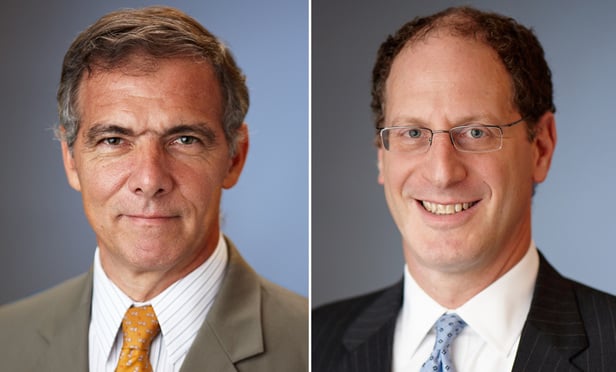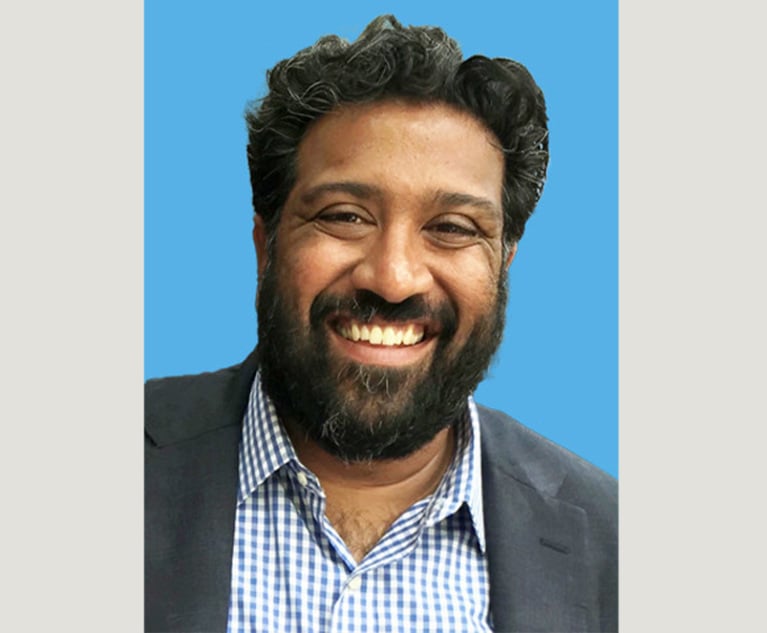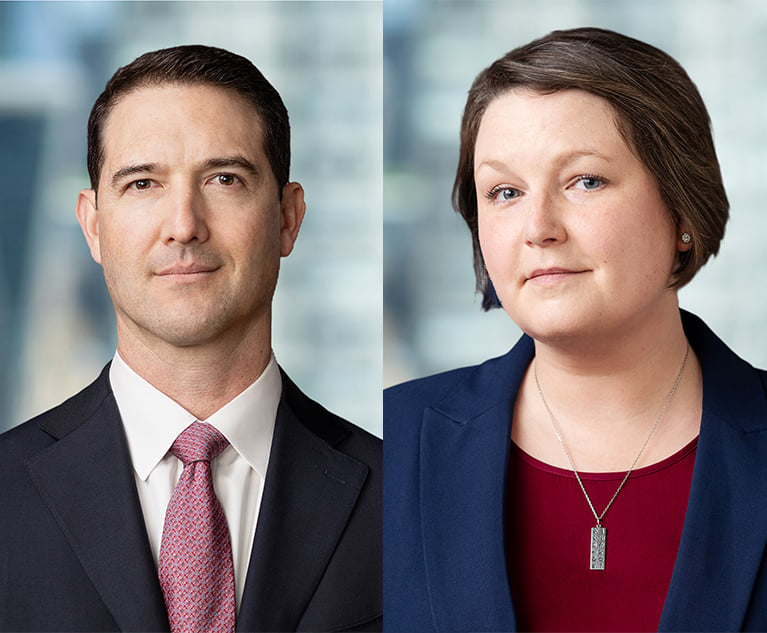Bridgegate: Open Questions After Supreme Court Narrows Fraud Statutes
White-Collar Crime columnists Robert J. Anello and Richard F. Albert discuss the Supreme Court's recent reversal of the "Bridgegate"-related convictions and its implications, writing that the extent to which the principles articulated in that decision will have an impact on future federal fraud prosecutions is currently being tested in another high-profile case currently on appeal before the Second Circuit where the "right to control" theory is at issue.
June 10, 2020 at 12:30 PM
12 minute read
 Robert J. Anello and Richard F. Albert
Robert J. Anello and Richard F. Albert
As this column has observed over the years, when federal prosecutors focus their attention on high profile misconduct that is not an obvious violation of federal criminal law, they often cannot resist the attractions of broadly worded "catch-all" fraud statutes like the one prohibiting wire fraud. From time to time, however, the Supreme Court has pushed back on efforts to further expand the boundaries of these statutes, leading to reversals of some well-publicized criminal convictions. The most recent example is the Supreme Court's reversal of the "Bridgegate"-related convictions of Bill Baroni, the former Deputy Executive Director of the Port Authority, and Bridget Anne Kelly, the former Deputy Chief of Staff to former New Jersey Governor Chris Christie. The unanimous "Bridgegate" decision's rationale, however, was relatively narrow. The court, for example, did not expressly weigh in on the controversial "right to control" theory, which provides that a defendant deprives a victim of "property" as required under the federal fraud statutes if he or she denies the victim the right to control how its assets are used. The extent to which the principles articulated in that decision will have an impact on future federal fraud prosecutions is currently being tested in another high-profile case currently on appeal before the Second Circuit where the "right to control" theory is at issue—the NCAA "hoops" case, otherwise known as United States v. Gatto.
Bridgegate Decision Reins in Prosecutors
In a 2013 incident that has since become infamous, to retaliate against Fort Lee's mayor, who refused to back then-Governor Christie's reelection campaign, Kelly, Baroni, and Baroni's chief of staff, David Wildstein, coordinated to close two of three lanes reserved at the George Washington Bridge's toll plaza for Fort Lee's morning commuters. The lane closures caused four days of gridlock in Fort Lee, and ended only when the Port Authority's Executive Director learned of the scheme. Wildstein pleaded guilty and agreed to cooperate with the government. Baroni and Kelly were tried and convicted before New Jersey District Judge Susan Wigenton in 2016 under the federal statutes prohibiting wire fraud and fraud on a federally funded program or entity. See 18 U.S.C. §§1343, 666(a)(1)(A). Their convictions were upheld by the Third Circuit. United States v. Baroni, 909 F.3d 550 (2018). In a unanimous opinion issued last month and authored by Justice Elena Kagan, the Supreme Court reversed the convictions, holding that statutes prohibiting wire fraud and fraud on a federally funded program "target fraudulent schemes for obtaining property"—referred to by the court as "property fraud"—and that the government failed to prove such a scheme. Kelly v. United States, 140 S. Ct. 1565 (2020).
The Government proffered two theories on appeal as to why Baroni's and Kelly's conduct was directed at "obtaining money or property," 18 U.S.C. §1343, and "obtain[ing] by fraud … property," §666(a)(1)(A), in violation of the statutes: (1) Baroni and Kelly sought to "commandeer" part of the Bridge itself by taking control of its physical lanes, and (2) they aimed to deprive the Port Authority of the costs of compensating the traffic engineers and back-up toll collectors who performed work relating to the lane realignment. Id. at 1572. The court rejected each theory for different reasons.
First, the court found that the act of closing the bridge lanes was not an act of "commandeering" but rather "a quintessential exercise of regulatory power." Id. "[Baroni and Kelly] (of course) did not walk away with the lanes; nor did they take the lanes from the government by converting them to a non-public use. Rather, Baroni and Kelly regulated use of the lanes, as officials responsible for roadways so often do—allocating lanes as between different groups of drivers." Id. at 1573. In making this distinction, the court focused on its decision in Cleveland v. United States, 531 U.S. 12 (2000), where it rejected a theory of property fraud where the defendant had engaged in a deceptive scheme to influence Louisiana's issuance of gaming licenses. Justice Kagan thus concluded that, with respect to the bridge lane closures, "that run-of-the-mine exercise of regulatory power cannot count as the taking of property." Kelly, 140 S. Ct. at 1573.
Second, the court acknowledged that "[a] government's right to its employees' time and labor, by contrast, can undergird a property fraud prosecution" but noted that "that property must play more than some bit part in a scheme: It must be an object of the fraud." Id. Applying that principle to the "Bridgegate" facts, Justice Kagan found that the time and labor of the Port Authority employees who implemented the lane closures were merely incidental costs and were not the object of the fraud. Id. at 1574.
The Right To Control Controversy
Before the Kelly decision was released, practitioners and commentators speculated that the Supreme Court would use the opportunity to address the controversial "right to control" theory of property fraud—namely that a "cognizable harm occurs [under the mail and wire fraud statutes] where the defendant's scheme denies the victim the right to control its assets by depriving it of information necessary to make discretionary economic decisions." United States v. Binday, 804 F.3d 558, 570 (2d Cir. 2015) (citing United States v. Rossomando, 144 F.3d 197, 201 n.5 (2d Cir.1998)) (internal quotation marks omitted). The Second Circuit has endorsed this broad reading of the federal fraud statutes, holding that fraudulent misrepresentations or non–disclosure of information can support a conviction under the "right to control" theory as long as those misrepresentations or non–disclosures "can or do result in tangible economic harm." United States v. Finazzo, 850 F.3d 94, 111 (2d Cir. 2017). Although the precise parameters of the "right to control" theory are the subject of dispute within the jurisdictions that expressly recognize it, see United States v. Gray, 405 F.3d 227, 234 (4th Cir. 2005) (citing with approval cases from the Second, Fifth, Sixth, Eighth, Tenth, and D.C. Circuits when endorsing the "right to control" theory), other Circuits have been less clear on whether they accept the theory at all.
The Supreme Court has not addressed the validity of the "right to control" theory. Many thought that the "Bridgegate" case presented a ripe opportunity to do so. At trial, Judge Wigenton instructed the jury that to prove its case, "the Government must also prove that the alleged scheme contemplated depriving the Port Authority of money and property." The court added that such deprivation occurred when "the organization is deprived of the right to control that money or property" which could occur "when the organization receives false or fraudulent statements that affect its ability to make discretionary economic decisions about what to do with that money or property." Baroni, 909 F.3d at 563. In response to the defendants' challenge to the "right to control" theory on appeal, the Third Circuit ruled that "[t]he Port Authority has an unquestionable property interest in the bridge's exclusive operation." Id. at 567. Indeed, the government argued its brief to the Supreme Court that "the right to control the real property of the George Washington Bridge [is] a 'species of valuable right or interest' that constitutes 'property' under the fraud statutes." Brief for the United States, No. 18-1059 (U.S. Nov. 22, 2019).
In the end, however, the Supreme Court avoided ruling directly on the validity of the "right to control" theory. Instead, the court stated that it had "already held" that an act such as the bridge lane closure was a "quintessential exercise of regulatory power" and relied on its previous decision in Cleveland. Kelly, 140 S. Ct. at 1572. By focusing on the regulatory power of the public entity at issue before it, the Court, while weakening the "right to control" theory's underpinnings, seemed to leave open the question whether, when a victim is in the private sector or is engaged in a non-regulatory function, a cognizable property harm occurs when a defendant deceptively "denies the victim the right to control its assets by depriving it of information necessary to make discretionary economic decisions." Binday, 804 F.3d at 570.
This open issue is currently at play in the NCAA case, where the defendants were convicted of defrauding Adidas-sponsored universities by causing them to issue basketball scholarships to high school athletes who had received bribe payments from the defendants to attend those universities in violation of NCAA rules.
The Right To Control the NCAA's Hoops Scholarships
In October 2018, James Gatto, Adidas's former head of global basketball marketing; Merl Code Jr., a former Adidas consultant; and an aspiring player agent named Christian Dawkins were found guilty of wire fraud and conspiracy to commit wire fraud after a three-week trial before Judge Lewis Kaplan in the Southern District of New York. The defendants were found to have bribed families of college basketball recruits in exchange for the prospects' commitment to play for university teams sponsored by Adidas. Such payments violated NCAA rules and made the recruits ineligible to play. The government alleged that the victims of this fraud were the universities, who granted scholarships to these recruits while unaware of the bribe payments.
On a motion to dismiss the indictment, the defense argued that the indictment failed to allege that the defendants schemed to obtain money or property from the universities. In denying the motion, Judge Kaplan cited the Second Circuit's endorsement of the "right to control" theory in Finazzo and upheld the indictment's allegation that the defendants "interfered with the universities' ability to control their assets." See United States v. Gatto, 295 F. Supp. 3d 336, 346 (S.D.N.Y. 2018). At trial, the court instructed the jury about the "right to control" theory as well.
The Gatto convictions are on appeal before the Second Circuit. The panel heard oral argument in March and, in the wake of Kelly, asked for supplemental briefing from the parties on the impact of the decision. In their supplemental brief, the defendants argued that "Kelly guts a key component of the convictions here—namely, that the Universities' 'right to control' the allocation of scholarships is a cognizable property interest under §1343." Seeming to skirt Kelly's reliance on the language of regulatory power, the defense observed that the universities are "state universities," and framed Kelly's holding as "a public institution's 'right to control' the allocation of benefits is not property." Given Cleveland's and Kelly's emphasis on the "traditional police powers" of the state when distinguishing property interests from regulatory interests, it will be interesting to see whether the Second Circuit considers a state university's scholarship decisions to fall within Kelly's rationale.
Conversely, the government argued in its supplemental brief that "the Supreme Court [did not] mention the right-to-control theory in its opinion." The government's position seems to fail to recognize the larger import of Kelly's narrowed construction of property for purposes of the criminal fraud statutes.
The Gatto appeal, however, may be decided based on Kelly's other holding—that the deprivation of the time and labor of the Port Authority employees could not be the basis of the fraud conviction because the property deprivation must be the "object of the fraud." The Gatto parties vigorously dispute this issue, with the defendants arguing that "[i]t was of no moment to Appellants whether the athletes received a scholarship, took out student loans, or had a wealthy relative to pay their college tuition,", and the government arguing that "the trial evidence established that obtaining a scholarship to play college basketball was essential to any player becoming professional, and thus equally essential to achieving any of the defendants' goals." Further, the District Court rejected the defendants' proposed instruction to the jury that "[t]he money or property deprivation must be a goal of the plot, not just an inadvertent consequence of it," and the defense's argument appears persuasive that this is reversible error in light of Kelly.
Bridgegate Likely To Reverberate in Other Pending Cases
The Kelly decision may impact a number of pending cases that turn on whether the defendant committed property fraud. For example, in United States v. Middendorf, also currently on appeal to the Second Circuit, the defendants were convicted of wire fraud for their scheme to obtain confidential audit lists from the Public Company Accounting Oversight Board. In declining to dismiss the indictment, Southern District Judge J. Paul Oetken deemed such lists to be property and found Cleveland to be inapposite. See United States v. Middendorf, No. 18-CR-36 (JPO), 2018 WL 3443117 (S.D.N.Y. July 17, 2018). A close analysis of Kelly's application of Cleveland to "Bridgegate" will likely be an area of focus for the Second Circuit.
In the "Varsity Blues" college admissions cases, where the defendants are accused of cheating on college entrance exams and making other misrepresentations in order to gain admission to competitive colleges, issues of whether the universities had a property interest in their "right to control" admissions and whether the "object" of the fraud was to deprive testing companies of property (as opposed to simply gaining admission to the university) are all at play. Kelly will likely play a significant role in those arguments.
Conclusion
Although the Bridgegate decision did not expressly resolve the "right to control" issue, it takes its place among Supreme Court decisions reining in prosecutors' expansive readings of the federal fraud statutes. Practitioners and commentators will be keeping a close eye on the decision's impact on pending fraud prosecutions as well as how it will affect prosecutors' future charging decisions.
Robert J. Anello and Richard F. Albert are partners at Morvillo Abramowitz Grand Iason & Anello, PC. Joseph Stern, an associate at the firm, assisted in the preparation of this article.
This content has been archived. It is available through our partners, LexisNexis® and Bloomberg Law.
To view this content, please continue to their sites.
Not a Lexis Subscriber?
Subscribe Now
Not a Bloomberg Law Subscriber?
Subscribe Now
NOT FOR REPRINT
© 2025 ALM Global, LLC, All Rights Reserved. Request academic re-use from www.copyright.com. All other uses, submit a request to [email protected]. For more information visit Asset & Logo Licensing.
You Might Like
View All
Come Fly With Me: DOJ’s Proposed FARA Amendments and the Tourism Industry
10 minute read

Law Firms Mentioned
Trending Stories
- 1Quiet Retirement Meets Resounding Win: Quinn Emanuel Name Partner Kathleen Sullivan's Vimeo Victory
- 2Balancing Hybrid Work With Relationship Building, Newly Merged Ballard Spahr Prioritizes 'Coaching Aspect' of Training New Associates
- 3Texas-Based Ferguson Braswell Expands in California With 6-Lawyer Team From Orange County Law Firm
- 4Hello, Greenberg: Key Player Returns to Big Law
- 5On the Move and After Hours: Einhorn Barbarito; Hartmann Doherty; Lowenstein Sandler; Lindabury McCormick
Who Got The Work
J. Brugh Lower of Gibbons has entered an appearance for industrial equipment supplier Devco Corporation in a pending trademark infringement lawsuit. The suit, accusing the defendant of selling knock-off Graco products, was filed Dec. 18 in New Jersey District Court by Rivkin Radler on behalf of Graco Inc. and Graco Minnesota. The case, assigned to U.S. District Judge Zahid N. Quraishi, is 3:24-cv-11294, Graco Inc. et al v. Devco Corporation.
Who Got The Work
Rebecca Maller-Stein and Kent A. Yalowitz of Arnold & Porter Kaye Scholer have entered their appearances for Hanaco Venture Capital and its executives, Lior Prosor and David Frankel, in a pending securities lawsuit. The action, filed on Dec. 24 in New York Southern District Court by Zell, Aron & Co. on behalf of Goldeneye Advisors, accuses the defendants of negligently and fraudulently managing the plaintiff's $1 million investment. The case, assigned to U.S. District Judge Vernon S. Broderick, is 1:24-cv-09918, Goldeneye Advisors, LLC v. Hanaco Venture Capital, Ltd. et al.
Who Got The Work
Attorneys from A&O Shearman has stepped in as defense counsel for Toronto-Dominion Bank and other defendants in a pending securities class action. The suit, filed Dec. 11 in New York Southern District Court by Bleichmar Fonti & Auld, accuses the defendants of concealing the bank's 'pervasive' deficiencies in regards to its compliance with the Bank Secrecy Act and the quality of its anti-money laundering controls. The case, assigned to U.S. District Judge Arun Subramanian, is 1:24-cv-09445, Gonzalez v. The Toronto-Dominion Bank et al.
Who Got The Work
Crown Castle International, a Pennsylvania company providing shared communications infrastructure, has turned to Luke D. Wolf of Gordon Rees Scully Mansukhani to fend off a pending breach-of-contract lawsuit. The court action, filed Nov. 25 in Michigan Eastern District Court by Hooper Hathaway PC on behalf of The Town Residences LLC, accuses Crown Castle of failing to transfer approximately $30,000 in utility payments from T-Mobile in breach of a roof-top lease and assignment agreement. The case, assigned to U.S. District Judge Susan K. Declercq, is 2:24-cv-13131, The Town Residences LLC v. T-Mobile US, Inc. et al.
Who Got The Work
Wilfred P. Coronato and Daniel M. Schwartz of McCarter & English have stepped in as defense counsel to Electrolux Home Products Inc. in a pending product liability lawsuit. The court action, filed Nov. 26 in New York Eastern District Court by Poulos Lopiccolo PC and Nagel Rice LLP on behalf of David Stern, alleges that the defendant's refrigerators’ drawers and shelving repeatedly break and fall apart within months after purchase. The case, assigned to U.S. District Judge Joan M. Azrack, is 2:24-cv-08204, Stern v. Electrolux Home Products, Inc.
Featured Firms
Law Offices of Gary Martin Hays & Associates, P.C.
(470) 294-1674
Law Offices of Mark E. Salomone
(857) 444-6468
Smith & Hassler
(713) 739-1250







